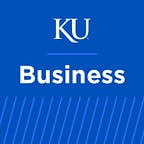Doctoral student follows in family’s educational footsteps
Ryan Clark grew up in a family of educators. It was that early foundation and understanding of education that would eventually pave the way for Clark to earn his doctoral degree in finance and continue in the family tradition of education.
Now as a fourth-year doctoral candidate in finance, the Kearney, Nebraska, native is taking that educational foundation and combining it with research.
“I always had an appreciation for educators,” Clark said. “As I went through college, I saw that research was a way to expand on that education. Deciding to get my doctorate was a way for me to continue beyond the classroom and the face-to-face interactions and to follow in their footsteps.”
Clark decided that he wanted to earn his doctorate while he was earning a bachelor’s in finance and math from the University of Nebraska at Kearney. In his last year, he began the application process by getting letters of recommendation and taking the GMAT. From there, he sent out applications to several different schools, including the KU School of Business. He was impressed with how quick KU was at getting his application processed and being accepted into the program.
“KU was the best of all the schools I applied to,” Clark said. “It was the quickest at responding and turning around everything. I heard back within a couple weeks from when the application closed compared to other schools. It was months before I heard back from other schools about where my application stood.”
At the School of Business, Clark has gained valuable experience inside and outside the classroom. He has taught courses like FIN 415 Corporate Finance, worked on several research projects with faculty and peers, and served as vice president and president of the Association of Business Doctoral Students, which puts on events for doctoral students to have fun and relax outside the classroom. He is also the recipient of the John O. Tollefson Doctoral Student Teaching Award, which he was nominated for by faculty after reviewing teaching evaluations, and received the John O. Tollefson Best Paper Award, an award that recognizes published or accepted papers in a refereed journal or conference from the previous calendar year.
In the classroom, Clark narrowed down his academic research interests with the help of the Finance academic area faculty. His research includes insider trading, behavioral finance, share repurchases and more. He believes it’s the faculty’s dedication and expertise that sets the KU School of Business apart from other programs.
“Our faculty really try to get involved with students from the very beginning,” Clark said. “I think there’s this tendency for faculty to wait a little bit for students to start to develop before they actually engage, but that is not what I’ve witnessed at KU. From the first time you step on campus, faculty doors are open. They’re always excited to talk with doctoral students about their research interests, and it just really helps you narrow down what you want to do. It helps you find people to work with. That certainly helped me as someone who bounced around a few different areas to really get a feel for what I’m interested in.”
School of Business doctoral students receive full tuition and fee payment and are supported in research or teaching assistantships or fellowships during their time in the program. Clark said this is beneficial to students so they can focus on teaching or research without having to take on additional jobs to make ends meet financially.
The support students receive is instrumental in helping doctoral students focus on research and teaching that will help them in their post-graduation job search. Charly Edmonds, doctoral program director, works with students to ensure they have everything they need to be successful inside and outside the classroom.
Getting a doctorate is no easy task. Clark recognizes the challenges and the need to have support in a program. The School of Business has made a difference in his journey with the melting pot of cultures, ideas and personalities who all come together to support each other in the school. He advises those wanting a doctorate to build that support system as soon as possible.
“Charly is a great resource and really advocates for doctoral students,” Clark said. “If we have anything that we want addressed, she’s there to help. I also recommend that people consider getting in touch with her and other doctoral students in your area. Ph.D. students will tend to give you more straightforward answers regarding the culture of a program. I believe finding the right fit in terms of interests and support is what will determine someone’s success in the program rather than simply their willingness to work hard. KU has done an excellent and intentional job of developing a collaborative Ph.D. program with the sole mission of helping its students to find success when they graduate.”
As Clark closes out his time in the doctoral program, he said he’s grateful to the students, faculty and staff who have supported him along the way. He will be on the academic job market this fall in hopes of becoming an assistant professor. He’s confident that his time in the doctoral program has set him up to be successful once he graduates.
“My advisors have worked diligently with me throughout my time at KU to make sure my research pipeline will be competitive,” Clark said. “The experience and feedback I received from my time teaching corporate finance to KU undergrads will also be extremely useful, showing prospective employers that I have experience and am comfortable in front of a classroom. The limited class size — between 15-20 students — allowed me to hone my teaching skills before facing larger classes as an assistant professor.”
